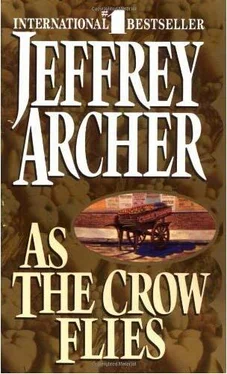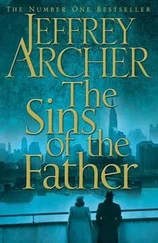The next morning I decided to return to the War Office and ask Sir Horace's old secretary if she knew of any way that one could trace the background of a former serving officer.
"Name?" said the prim middle-aged woman who still kept her hair tied in a bun, a style left over from the war.
"Guy Trentham," I told her.
"Rank and regiment?"
"Captain and the Royal Fusiliers would be my guess."
She disappeared behind a closed door, but was back within fifteen minutes clutching a small brown file. She extracted a single sheet of paper and read aloud from it. "Captain Guy Trentham, MC. Served in the First War, further service in India, resigned his commission in 1922. No explanation given. No forwarding address."
"You're a genius," I said, and to her consternation kissed her on the forehead before leaving to return to Cambridge.
The more I discovered, the more I found I needed to know, even though for the time being I seemed to have come to another dead end.
For the next few weeks I concentrated on my job as a supervisor until my pupils had all safely departed for their Christmas vacation.
I returned to London for the three-week break and spent a happy family Christmas with my parents at the Little Boltons. Father seemed a lot more relaxed than he had been during the summer, and even Mother appeared to have shed her unexplained anxieties.
However, another mystery arose during that holiday and as I was convinced it was no way connected with the Trenthams, I didn't hesitate to ask my mother to solve it.
"What's happened to Dad's favorite picture?"
Her reply saddened me greatly and she begged me never to raise the subject of The Potato Eaters with my father.
The week before I was due to return to Cambridge I was strolling back down Beaufort Street towards the Little Boltons, when I spotted a Chelsea pensioner in his blue serge uniform trying to cross the road.
"Allow me to help you," I offered.
"Thank you, sir," he said, looking up at me with a rheumy smile.
"And who did you serve with?" I asked casually.
"The Prince of Wales Own," he replied. "And you?"
"The Royal Fusiliers." We crossed the road together. "Got any of those, have you?"
"The Fussies," he said. "Oh, yes, Banger Smith who saw service in the Great War, and Sammy Tomkins who joined up later, twenty-two, twenty-three, if I remember, and was then invalided out after Tobruk."
"Banger Smith?" I said.
"Yes," replied the pensioner as we reached the other side of the road. "A right skiver, that one." He chuckled chestily. "But he still puts in a day a week at your regimental museum, if his stories are to be believed."
I was first to enter the small regimental museum in the Tower of London the following day, only to be told by the curator that Banger Smith only came in on Thursdays, and even then couldn't always be relied on. I glanced around a room filled with regimental mementoes, threadbare flags parading battle honors, a display case with uniforms, out-of-date implements of war from a bygone age and large maps covered in different colored pins depicting how, where and when those honors had been won.
As the curator was only a few years older than me I didn't bother him with any questions about the First World War.
I returned the following Thursday when I found an old soldier seated in a corner of the museum pretending to be fully occupied.
"Banger Smith?"
The old contemptible couldn't have been an inch over five feet and made no attempt to get up off his chair. He looked at me warily.
"What of it?"
I produced a ten-bob note from my inside pocket.
He looked first at the note and then at me with an inquiring eye. "What are you after?"
"Can you remember a Captain Guy Trentham, by any chance?" I asked.
"You from the police?"
"No, I'm a solicitor dealing with his estate."
"I'll wager Captain Trentham didn't leave anything to anybody."
"I'm not at liberty to reveal that," I said. "But I don't suppose you know what happened to him after he left the Fusiliers? You see, there's no trace of him in regimental records since 1922."
"There wouldn't be, would there? He didn't exactly leave the Fussies with the regimental band playing him off the parade ground. Bloody man should have been horsewhipped, in my opinion."
"Why . . . ?"
"You won't get a word out of me," he said, "Regimental secret," he added, touching the side of his nose.
"But have you any idea where he went after he left India?"
"Cost you more than ten bob, that will," said the old soldier, chuckling.
"What do you mean?"
"Buggered off to Australia, didn't he? Died out there, then got shipped back by his mother. Good riddance, is all I can say. I'd take his bloody picture off the wall if I had my way."
"His picture?"
"Yes. MCs next to the DSOs, top left-hand corner," he said, managing to raise an arm to point in that direction.
I walked slowly over to the corner Banger Smith had indicated, past the seven Fusilier VCs, several DSOs and on to the MCs. They were in chronological order: 1914—three, 1915—thirteen, 1916—ten, 1917—eleven, 1918—seventeen. Captain Guy Trentham, the inscription read, had been awarded the MC after the second battle of the Marne on 18 July 1918.
I stared up at the picture of a young officer in captain's uniform and knew I would have to make a journey to Australia.
"When were you thinking of going?"
"During the long vacation."
"Have you enough money to cover such a journey?"
"I've still got most of that five hundred pounds you gave me when I graduated—in fact the only real outlay from that was on the MG; a hundred and eighty pounds, if I remember correctly. In any case, a bachelor with his own rooms in college is hardly in need of a vast private income." Daniel looked up as his mother entered the drawing room.
"Daniel's thinking of going to America this summer."
"How exciting," said Becky, placing some flowers on a side table next to the Remington. "Then you must try and see the Fields in Chicago and the Bloomingdales in New York, and if you have enough time you could also—"
"Actually," said Daniel, leaning against the mantelpiece, "I think I'll be trying to see Waterstone in Princeton and Stinstead at Berkeley."
"Do I know them?" Becky frowned as she looked up from her flower arranging.
"I wouldn't have thought so, Mother. They're both college professors who teach maths, or math, as they call it."
Charlie laughed.
"Well, be sure you write to us regularly," said his mother. "I always like to know where you are and what you're up to."
"Of course I will, Mother," said Daniel, trying not to sound exasperated. "If you promise to remember that I'm now twenty-six years old."
Becky looked across at him with a smile. "Are you really, my dear?"
Daniel resumed to Cambridge that night trying to work out how he could possibly keep in touch from America while he was in fact traveling to Australia. He disliked the thought of deceiving his mother, but knew it would have pained her even more to tell him the truth about Captain Trentham.
Matters weren't helped when Charlie sent him a first-class ticket for New York on the Queen Mary for the exact date he had mentioned. It cost one hundred and three pounds and included an open-ended return.
Daniel eventually came up with a solution. He worked out that if he took the Queen Mary bound for New York the week after term had ended, then continued his journey on the Twentieth Century Limited and the Super Chief across the States to San Francisco, he could pick up the SS Aorangi to Sydney with a day to spare. That would still give him four weeks in Australia before he would have to repeat the journey south to north, allowing him just enough time to arrive back in Southampton a few days before the Michaelmas term began.
Читать дальше












